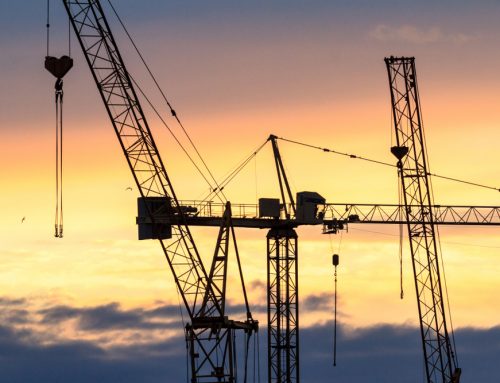Coronavirus Construction Update: a view of the effects of COVID-19 on the industry and our insights for those using the JCT suite of contracts
On construction projects, the COVID-19 pandemic has meant there have been closures of sites aplenty; there will almost certainly have been reduced staff at manufacturing facilities, and even as the UK slowly returns to work, there are likely to be labour issues whether that be shortages of workers or logistical challenges around working two metres apart.
The UK Government recently revised the COVID-19 guidelines in a move to gradually ease the current state of lockdown, yet, the existence of COVID-19 along with social distancing requirements are still having a major effect on the construction industry.
Clients have been asking us “who is going to bear the risk of the time and cost consequences that will now inevitably flow from a period of lockdown”?
Anyone involved in a current or planned construction project might be well advised to consider:
a. how risks are allocated under their existing contracts, and when any notices of delay should be given;
b. appropriate steps to mitigate delays and prolongation costs; and
c. ensure that future contracts provide clarity as to how risk events will be addressed.
The parties’ rights and obligations on current projects will – to a significant extent – depend on the contractual terms in place, and how those terms apply to the factual situation as it unfolds.
This article focuses on the position under the JCT suite of contracts.
JCT Contracts
On the question of delay/disruption (and claims for money flowing as a result), other than the JCT Minor Works Contract and Minor Works Contract with Contractor’s design which are more simplistic in approach the general position under un-amended JCT 2016 suite of contracts is summarised here.
What do the JCT contracts say?
The JCT 2016 suite of contracts entitle the Contractor to an extension of time where a project is delayed due to a “Relevant Event” and to recover loss and expense arising from a “Relevant Matter” (with Relevant Matters much more limited in scope than Relevant Events).
The overarching principles are that (i) the Contractor carries time and cost risk for items within its control (including the supply of labour and materials) and (ii) save for matters expressly within the Employer’s control, delay events are “cost neutral” (in the sense that the Contractor is relieved from delay damages but the Employer does not pick up prolongation costs). The JCT requires the Contractor to give notice of a possible delay “if and whenever it becomes reasonably apparent that the progress of the Works is or is likely to be delayed” and makes the Contractor’s entitlement to time conditional on having exercised its best endeavours to prevent delay.
A delay attributable to COVID-19 might give rise to a time claim if it is caused by:
- government action, such as public health measures that have interfered with site operations;
- an Employer instruction or act of prevention;
- labour issues caused by civil commotion or union action, such as mass walkouts;
- non-performance by utilities providers or delays in receipt of statutory permissions and consents (e.g. due to their own labour or supply constraints); or
- force majeure (as to which see further below)
Of the above, only Employer instructions or acts of prevention constitute Relevant Matters entitling the Contractor to additional loss and expense in addition to being Relevant Events.
That means that the way in which a delay arises will be critical in determining its contractual consequences. Taking the example of a site shutdown, if that resulted from government intervention or force majeure, the Contractor could claim an extension of time but not loss and expense; if it arose from the Employer’s instruction, however, a claim to both time and money could follow. The well-meaning Employer or contract administrator who has issued an instruction to suspend works on health & safety grounds may suddenly find themselves on the wrong end of a loss and expense claim
Delays caused by shortages of labour or materials, on the other hand, would remain Contractor risk items unless they result from a Relevant Event and the Contractor has used its best endeavours to source alternative supplies.
Finding Commercial Solutions
It is often beneficial to look to seek a commercial solution with the other parties regarding delays attributable to COVID-19 in order to ensure the project can continue in the most efficient way possible, whilst also ensuring positive relationships are maintained. Such commercial solutions will need to be drafted correctly to ensure they vary the original contract in a manner which does not prejudice the parties’ ability to rely on the original contract. Such solutions might include:
- Advance payments if cash flow becomes an issue.
- Off-site material payments could be made in exchange for a bond or other vesting certificates.
- Adjusting the frequency of valuations and payments.
- Monthly reviews put in place to help adapt the finer terms of the contract to account for the unprecedented and ever-changing national circumstances and government guidelines.
- Engagement could be sought with third party Contractors to help manage expectations.
- Collaboration between the parties so as to uphold health and safety requirements in line with government guidance.
- Lengthening the period of time each party has until a right of termination arises under the contract (see below). This would have the mutual benefit of tying the Contractor in to complete the works when possible whilst also giving the Contractor comfort that a certain pipeline of works will remain.
The purpose of these and other such solutions is to spread the risk evenly across the parties so as to ensure completion of projects as safely and as swiftly as possible.
Termination
There may be circumstances in which there is no option but to terminate the entire contract. Under clause 8.11 of a standard JCT contract, either party has the right to terminate the contract if a suspension of whole of, or substantially the whole of, the works last for longer than a relevant period; usually 2 months, for reasons of force majeure or government action . Even with the gradual easing of lockdown restrictions, certain long-term restrictions such as the 2 metre social distancing requirement may on some projects continue to cause suspension of the whole of the works. Termination must be approached cautiously however. The terminating party must be sure that the reason for delay gives rise to the termination event and not anything attributable to its own actions. If termination is a consideration it is often best to seek legal advice.
Force Majeure
Force majeure is not defined in the JCT suite (an opportunity missed in successive revamps since 2005), and there is no authoritative guidance on its meaning from the English courts – which leaves real scope for uncertainty.
Case law indicates that a force majeure event must be outside the control of the parties (such that they could not have prevented its consequences) and must not have been foreseeable at the date of the contract. A Contractor would no doubt argue that a COVID-19 epidemic or pandemic would satisfy those requirements and would therefore fall squarely within the scope of a Relevant Event (at least where the contract was entered into before the spread of the virus became foreseeable).
There is a further question (to be resolved by reference to the contract wording) as to whether a force majeure event must render performance physically or legally impossible, or whether it is sufficient if it merely hinders performance. The courts have not examined the JCT wording from this perspective, and there are arguments either way. JCT anticipates an extension of time if force majeure “delays” (as opposed to “prevents”) performance, but only if the Contractor has used best endeavours to prevent delay – and unless supplies of labour and materials are unavailable from alternative sources, that will be a high burden to meet.
Frustration
Frustration operates in a similar manner to a force majeure clause and is a term that has been much used in the current climate as a potential solution or remedy for parties who may be trying to release themselves from their obligations under a contract. Frustration occurs when an unforeseen event takes place, without the fault of either party, which significantly changes the nature of rights and obligations under the contract such that it would be unjust, under new circumstances, to hold the parties to the original agreement. Both parties are then discharged from further performance.
Frustration only occurs when a contract is silent as to any such unforeseen events, or if it lacks a force majeure clause, and so is rarely used in practice. The doctrine is also very difficult to prove, as the unforeseen event must make completion of the contract almost impossible; being more expensive or arduous will not suffice. Therefore, its application is limited.
Dispute Resolution
Given the substantial effects of COVID-19 as well as the developing uncertainty surrounding the government guidelines as the national lockdown begins to ease, the most likely cause of a dispute will be breach of contract in relation to works not being completed on time. Claims may also arise from work completed to an unsatisfactory standard, either due to the lack of materials available, or social distancing limitations.
As discussed earlier, before commencing a formal process for dispute resolution it can often be beneficial to enter into a dialogue with the other party to see if a commercial solution can be negotiated and agreed.
It is important for an Employer or Contractor to keep detailed notes, records and evidence of work completed on a project as well as all correspondence, including during the time where a commercial settlement is being discussed. This will assist should you need to set out your case in future.
Further, and in terms of how best to avoid a formal dispute, it is helpful to be aware of your contractual obligations so as to ensure compliance with all notice requirements and timelines which should help to prevent a breach of contract claim arising.
Investing time and money in litigation is unlikely to be welcomed by Employers or Contractors in the current circumstances of COVID-19. However, should communication between the Employer and the Contractor break down, pursuing forms of dispute resolution may be the only solution. It is important to check the terms of the agreement as many JCT contracts will specify how a dispute should be resolved. The most common is adjudication. This is a relatively quick process to settle a dispute and involves presenting to a pre-selected adjudicator. The decision of the adjudicator may then be reviewed in arbitration or litigation. We suggest obtaining legal advice before proceeding with formal methods of dispute resolution.
The Future
It is important, now more than ever, for Employers and Contractors alike to have an understanding of the provisions of their own JCT contracts. The provisions of the contract will continue to apply when seeking additional costs, an extension of time or a full termination. Cost calculations and payment mechanisms will be governed by the agreed upon terms, while the provisions relating to disputes will likely set out a clear path on how to proceed. It is important to seek legal advice should you be unclear on any of your legal obligations.
Looking ahead, it would be sensible to consider health checking your contracts. Could someone in the organisation check all your current contracts, and for the future check template notices etc.? Do all relevant people understand how to use the notices correctly, or would some training help?
Indeed, for any new project, we would suggest any Employer or Contractor is well advised to tackle these issues head on. Is it worthwhile, for example, introducing a new Relevant Event for the likely effects of COVID-19 in the event that a second out-break occurs, or does the programme already take this into account?
Whilst there would probably be little argument that the construction industry would like to see a return to the pre COVID-19 normal, it would appear more than likely that the construction industry as well as the rest of society will have to adjust to a “new-normal”. Documenting what this “new-normal” is and being aware of its consequences will be just as important as ever.
Please contact Robert Tunningley, Partner on 020 7611 2370 or Sarah Emerson, Partner on 020 7611 4895 if you would like advice on the issues discussed in this article or related matters.









